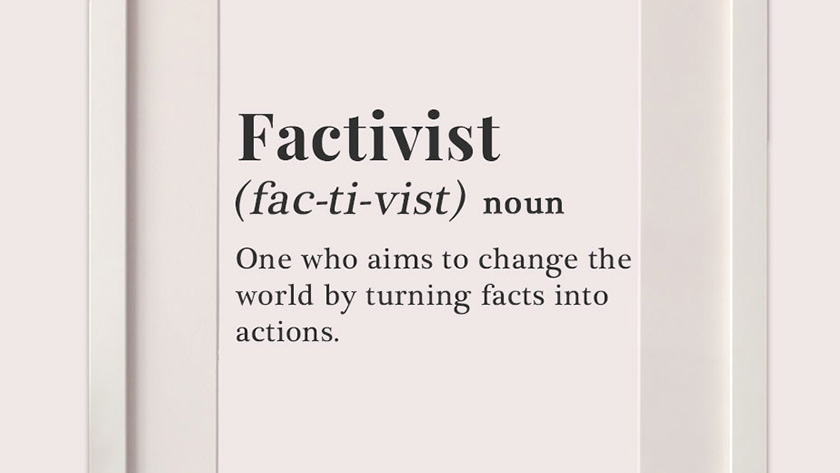Let’s come together to accelerate progress in up-to-date data on the Sustainable Development Goals in an accessible and engaging way.
Humans have a complicated relationship with facts—something we’ve seen clearly during this disastrous year. In this polarized world, the Sustainable Development Goals (SDGs) remain a remarkable achievement—a shared vision for every child and adult on the planet. So, the data should follow, right? Not so much. Even ‘impatient optimists’ Bill and Melinda Gates used their Goalkeeper’s report to highlight the COVID-19-related loss of 25 years’ progress in just 25 weeks. Accurate data lags behind the timeline needed for decisive action, they bemoaned.
The world is getting short-changed on data. It’s time we raise our collective voice about the importance of fast, actionable data to our lives—it’s time we become factivists. As we celebrate the five-year anniversary of the SDGs and the Global Partnership for Sustainable Development Data’s fifth anniversary, we’ll come together on September 25th to mark the first-ever “Global Goals Day of Factivism.”

Born out of a collaboration with our partners the UN Sustainable Development Solutions Network (SDSN) and Project Everyone, we aim to spotlight the importance of timely data. A social media public advocacy campaign will bring to life the data behind the Global Goals, highlighting ten timely facts about the state of our world right now and inspiring people to take action. We hope you’ll join us.
Factivism can take many forms. For example, the Uwezo initiative in east Africa publishes data from household surveys that monitor children’s literacy and numeracy so citizens can hold local and national governments to account for their education work. While in the Philippines, Plan International has been working to increase rates of birth registration; proof of age is essential in the fight against child labor.
Timely, reliable, and accurate data matter now more than ever but there are a few things holding us back:
Solid data is still treated as an extra
Global financing for foundational data systems falls far short of what is needed. It should be a source of global shame that the causes of more than half of all global deaths still go unrecorded each year. Politicians know that when it comes to their citizens’ wellbeing, there is a gap between hopeful rhetoric and hard reality. It isn’t always politically expedient to quantify that disparity with data. Thankfully governments do have a group of people entrusted with objectively measuring whether their countries are moving ahead or letting groups of people fall behind—national statistical offices are our exasperated heroes and deserve much more resources and attention.
Governments funding aid programs in other countries could lead by example, putting a percentage of their health spending into building the systems that consistently and reliably produce the data that underpins all policy and programming for global health–an investment that would increase pandemic preparedness.
Let’s lobby for better data on our collective health outcomes, air pollution, educational attainment, and fight to uplift those who are suffering overlapping deprivation. The investment will follow.

Our linear data systems are not fit for this erratic world
Most of the data collection efforts that inform the world’s policymaking are based on an assumption of slow incremental change. One of the tragic consequences of the pandemic is the obliteration of the 2020 round of censuses, which will have ramifications for years to come.
Global threats like climate catastrophes, mass migration, tech-enabled election interference, and pandemics outpace our ability to process this change. We can do better. Even the most advanced countries have appalling gaps in data. We don’t have comparable city-level data across the entire United States on maternal mortality, for example. We need strong systems, not silos, and that coordination must be global as well as national—especially at a time when schools are shutting doors and borders are closing based on patchy data.
Stronger data systems, protocols, and standards for sharing data across borders is a critical ingredient in the effective global response to COVID-19. We all depend on each other’s data to keep us safe.
Number crunchers tend to be poor communicators
In our hyper-stimulated, hyper-partisan, hyped-up world, data geeks don’t do themselves any favors. We look to the trajectory of the gender equity and climate movements and see their growing traction as they’ve gotten organized and mainstreamed those issues to a global public. The Global Partnership, supported by the Skoll Foundation, is working with the United Nations Economic Commission for Africa (UNECA) to help countries communicate COVID-19 data and trends. We are currently engaging in 40 countries across Africa, with a roster of 30 supply-side partners who will work with those countries, bringing different skills and assets to bear, and have already developed or strengthened partnerships in 21 countries. Find more details in our fifth-anniversary report, published today.
For those looking to engage the wider world, better learning resources, advocacy toolkits, stories, and videos about people, dynamic data visualizations, and dashboards all help us become factivists and fight for more equality using data.
Want more stories of transformational change on the world’s most pressing problems? Sign up for Skoll Foundation’s monthly newsletter.